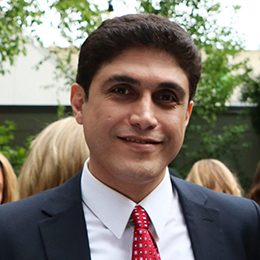
Chief Executive and Director, Harvard Medical School International Center for Genetic Disease
Principal Investigator and Director, Bahrain National Genome Program at Harvard
Assistant Professor of Medicine, Harvard Medical School, and Brigham and Women's Hospital
Dr. Haghighi is an Assistant Professor and clinician-scientist in the Department of Medicine, Brigham and Women's Hospital, Harvard Medical School. He is internationally recognized for his leadership in projects aimed at improving health and well-being worldwide. Dr. Haghighi regularly advises government leaders on national health policies and initiatives. He is an American Board-Certified Geneticist. He completed his graduate and clinical training at the University of Oxford, and Harvard Medical School.
Dr. Haghighi is the Chief Executive and Founding Director of the Harvard Medical School International Center for Genetic Disease (iCGD), and the Principal Investigator (PI) and Director of the National Genome Project of Bahrain.
For his research, he investigates the genetic basis of human disease, with a focus on cardiovascular disease (e.g., cardiomyopathies, and congenital heart disease) and translating these research discoveries into better diagnostics and improved patient care. He is the PI on two NIH- and AHA-funded projects for investigating the genetics of unexplained cardiomyopathies in adults and children. He is also the Director of the GEnetics NEtwork in the Middle East and Africa (GENE-ME), a large clinical research network for genetic studies in those regions that aims to: (1) identify novel disease-causing mutations and genotype-phenotype correlations, and (2) advance genomic medicine in the Middle East and Africa through capacity building.
Dr. Haghighi has led many international projects to advance medical science in different countries and improve the health and well-being of people. He is the Founding President of the Advancement Initiative for Medicine and Science (AIMS). This global foundation brings together academics and physicians and is dedicated to advancing medical science and healthcare around the world.
Among the many prestigious awards and honors, he has received for his scientific and international contributions are the Global Health Pioneer Award (for his pivotal role in enhancing the quality of life through innovative strategies and capacity-building initiatives), and the International Genetic Disorders Prevention Award (for outstanding contributions to and scientific excellence in genetic research).

Chief Executive and Director, Harvard Medical School International Center for Genetic Disease
Principal Investigator and Director, Bahrain National Genome Program at Harvard
Assistant Professor of Medicine, Harvard Medical School, and Brigham and Women's Hospital
Dr. Haghighi is an Assistant Professor and clinician-scientist in the Department of Medicine, Brigham and Women's Hospital, Harvard Medical School. He is internationally recognized for his leadership in projects aimed at improving health and well-being worldwide. Dr. Haghighi regularly advises government leaders on national health policies and initiatives. He is an American Board-Certified Geneticist. He completed his graduate and clinical training at the University of Oxford, and Harvard Medical School.
Dr. Haghighi is the Chief Executive and Founding Director of the Harvard Medical School International Center for Genetic Disease (iCGD), and the Principal Investigator (PI) and Director of the National Genome Project of Bahrain.
For his research, he investigates the genetic basis of human disease, with a focus on cardiovascular disease (e.g., cardiomyopathies, and congenital heart disease) and translating these research discoveries into better diagnostics and improved patient care. He is the PI on two NIH- and AHA-funded projects for investigating the genetics of unexplained cardiomyopathies in adults and children. He is also the Director of the GEnetics NEtwork in the Middle East and Africa (GENE-ME), a large clinical research network for genetic studies in those regions that aims to: (1) identify novel disease-causing mutations and genotype-phenotype correlations, and (2) advance genomic medicine in the Middle East and Africa through capacity building.
Dr. Haghighi has led many international projects to advance medical science in different countries and improve the health and well-being of people. He is the Founding President of the Advancement Initiative for Medicine and Science (AIMS). This global foundation brings together academics and physicians and is dedicated to advancing medical science and healthcare around the world.
Among the many prestigious awards and honors, he has received for his scientific and international contributions are the Global Health Pioneer Award (for his pivotal role in enhancing the quality of life through innovative strategies and capacity-building initiatives), and the International Genetic Disorders Prevention Award (for outstanding contributions to and scientific excellence in genetic research).
Journal article
Immunonutrition refers to nutritional interventions that can improve immune function. The nutritional contents used in immunocytes include amino acids, vitamins, minerals, and flavonoids. In this study, we examine the oxi-inflamm-aging theory, which illustrates the antioxidant effects of diet, immune system performance, and life span. According to this theory, if vitamin C is consumed in the early stages of life, it can increase life span. The main objective of this study was to investigate the...
Journal article
No abstract